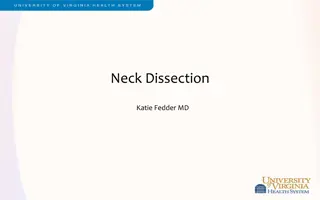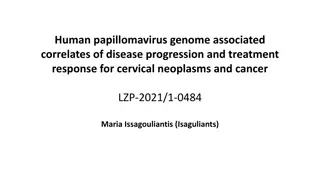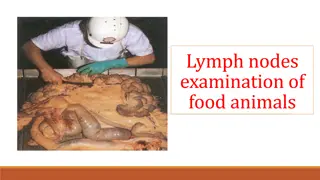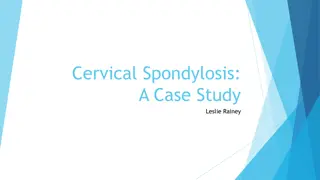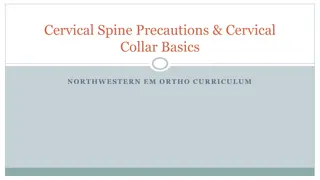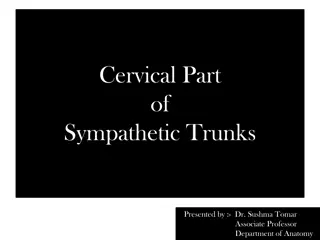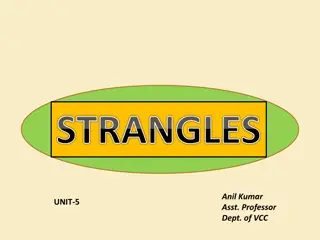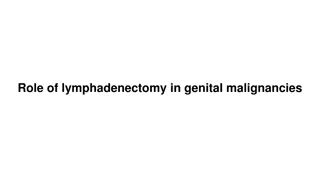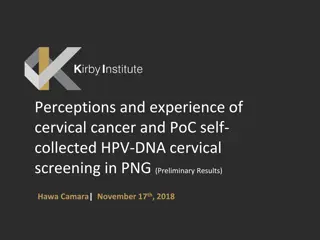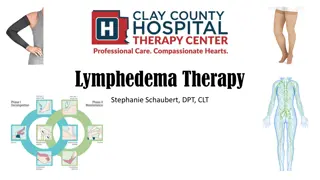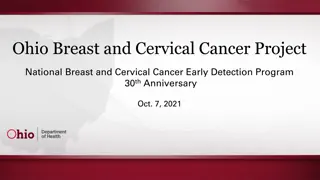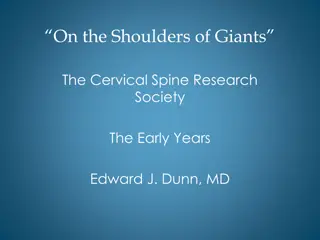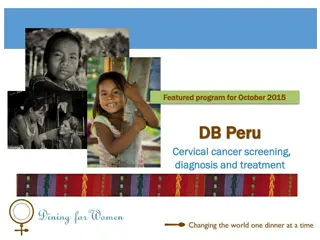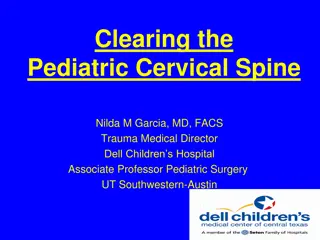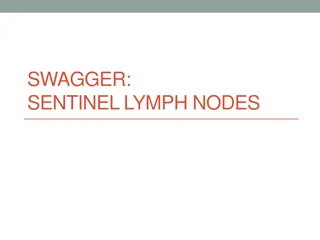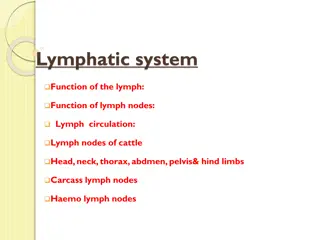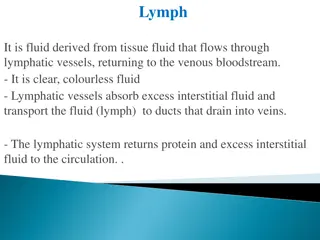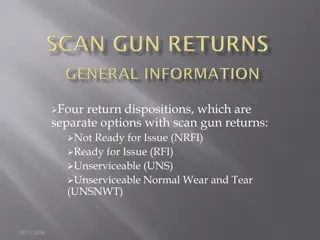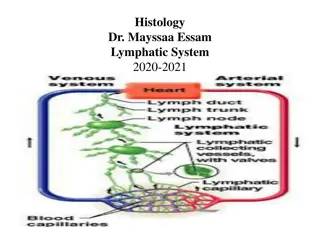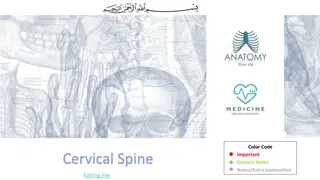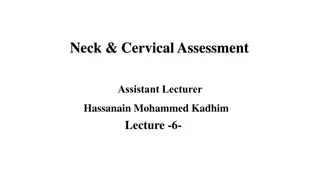What you need to know about the HPV Vaccine
Globally, cervical cancer is the fourth most common cancer in women, with 6,04,000 new cases in 2020. Women living with HIV are 6 times more likely to develop cervical cancer, compared to the general population, and an estimated 5% of all cervical cancer cases are attributable to HIV. The contributi
3 views • 7 slides
Approach to Critically Ill Patient: Primary Survey and Airway Management
This material provides a structured approach to managing critically ill patients, focusing on the primary survey steps including airway and cervical spine control. It covers assessment techniques, interventions, and guidelines for ensuring patient safety, particularly in cases of potential airway co
1 views • 38 slides
Overview of Neck Dissection in Head and Neck Cancer
Neck dissection is a crucial procedure for the prognostic and therapeutic management of head and neck cancers, particularly in cases where cancer has spread to the cervical lymph nodes. This process involves removing all lymph nodes and surrounding structures in the neck region to prevent the spread
8 views • 25 slides
Overview of the NHS Cervical Screening Programme
The NHS Cervical Screening Programme aims to reduce the incidence and mortality of invasive cervical cancer by offering regular screening to eligible individuals. It covers the history, population screening programmes, and key milestones. Learn about the importance, coverage, and guidelines of the p
6 views • 19 slides
Guidance for the training of cervical sample takers
Efficient and accurate cervical screening sample requests are crucial for timely and appropriate patient management. Utilizing the Open Exeter system, sample takers can access pre-populated forms to streamline the process. When deviating from Open Exeter, providing a valid explanation ensures contin
7 views • 13 slides
Investigating Human Papillomavirus Genomes in Cervical Neoplasms
This project focuses on studying the Human Papillomavirus (HPV) genome's association with disease progression and treatment response in cervical neoplasms and cancer. The research aims to genotype high-risk HPVs in healthy and diseased cervix, identify prevalent genotypes, detect genotype drift, cha
1 views • 13 slides
Understanding UML Deployment Diagrams
UML Deployment Diagrams show the execution architecture of software systems, illustrating how software deployment targets are assigned artifacts to nodes. Nodes represent hardware devices or software environments connected through communication paths, while artifacts are concrete elements deployed o
1 views • 22 slides
Understanding Byzantine Fault Tolerance in Distributed Systems
Byzantine fault tolerance is crucial in ensuring the reliability of distributed systems, especially in the presence of malicious nodes. This concept deals with normal faults, crash faults, and the challenging Byzantine faults, where nodes can exhibit deceptive behaviors. The Byzantine Generals Probl
0 views • 29 slides
Understanding Lymph Node Examination in Food Animals
The lymphatic system plays a crucial role in maintaining the body's health by supplying oxygen and nutrients to tissues and removing waste products. Lymph nodes are round masses of lymphoid tissue found along lymphatic vessels, containing lymphocytes within a capsule of connective tissue. Characteri
1 views • 9 slides
Understanding Neck Anatomy: Triangles, Glands, and Lymph Nodes
Explore the intricate anatomy of the neck, including the various triangles, thyroid and parotid gland structures, as well as cervical lymph nodes. Delve into the essentials of neck mass evaluation, differential diagnosis, and management strategies. Enhance your knowledge of head and neck surgery thr
0 views • 53 slides
Cervical Spondylosis: Understanding Symptoms, Evaluation, and Treatment Options
Cervical spondylosis is a degenerative condition of the spine that can lead to neck pain, limited range of motion, and other discomforts. In this case study of an 85-year-old female, the subjective and objective evaluations reveal symptoms and physical findings associated with cervical spondylosis.
1 views • 18 slides
Cervical Spine Precautions & Cervical Collar Basics
Cervical collars, also known as C-Collars, are medical devices worn around the neck to support and immobilize the cervical spine. They are commonly used after trauma or surgery. Trauma patients with blunt traumatic injuries may benefit from C-Collar placement based on clinical judgment. It is import
0 views • 11 slides
Understanding the Cervical Part of Sympathetic Trunks
The sympathetic trunks play a crucial role in the human body, with the cervical part located in front of the transverse processes of cervical vertebrae and the neck of the 1st rib. This part presents three ganglia - superior, middle, and inferior. Sometimes, the inferior cervical and first thoracic
0 views • 25 slides
Understanding Strangles in Horses: Symptoms, Treatment, and Complications
Strangles, also known as Equine Distemper, is an infectious disease affecting horses and equids. It is characterized by upper respiratory tract infection, lymph node abscesses, and various complications. Symptoms include nasal discharge, coughing, and swelling of lymph nodes. Prompt diagnosis and tr
3 views • 11 slides
Role of Lymphadenectomy in Genital Malignancies
Pelvic and paraaortic lymph node evaluation is crucial in the surgical staging of gynecological malignancies. The goals of lymph node dissection are to determine disease extent and guide further treatment. Pelvic lymph nodes include common iliac, external and internal iliac, obturator, sacral, and p
0 views • 16 slides
Understanding Redis Cluster Distribution Approach
Redis Cluster offers a pragmatic approach to distribution, connecting all nodes directly with a service channel. Each node communicates using a binary protocol, optimized for bandwidth and speed. Nodes do not proxy queries, and communication involves messages like PING, PONG, and Gossip. Hash slot k
0 views • 17 slides
Perceptions and Experiences of Cervical Cancer and PoC Self-Collected HPV-DNA Cervical Screening
Explore the preliminary results of a study on perceptions and experiences of cervical cancer and point-of-care self-collected HPV-DNA cervical screening. The study highlights the need for improved screening services, introduces WHO GeneXpert PoC HPV-DNA technology, and advocates for global cervical
1 views • 25 slides
Understanding Doubly Linked Lists in C Programming
A doubly linked list in C comprises nodes with pointers to the next and previous nodes. Managing two sets of pointers can be complex, but adds flexibility for adding and removing nodes dynamically. This post explores the structure, implementation, and examples of doubly linked lists in C.
0 views • 13 slides
Economic Models of Consensus on Distributed Ledgers in Blockchain Technology
This study delves into Byzantine Fault Tolerance (BFT) protocols in the realm of distributed ledgers, exploring the complexities of achieving consensus in trusted adversarial environments. The research examines the classic problem in computer science where distributed nodes communicate to reach agre
0 views • 34 slides
Expression Tree Construction: Building Fully Parenthesized Expression Trees
In the process of building expression trees, nodes are inserted based on operators and operands, creating a fully parenthesized expression. The construction involves parsing the expression, inserting new nodes as tokens are examined, and linking nodes accordingly. By following the steps for handling
0 views • 17 slides
Understanding Trees and Binary Trees in Data Structures
A tree in data structures is a finite set of nodes with a designated root and subtrees, including internal nodes and leaf nodes. Terminology like root, parent nodes, leaves, and levels are explained, along with concepts of height and degree of a tree. Additionally, binary trees are introduced as a s
1 views • 94 slides
Understanding Centrality Measures in Peer-to-Peer and Social Networks
Centrality measures in networks quantify the importance of nodes based on their influence, accessibility, and role as connectors. Important centrality measures include Degree centrality (based on the number of connections), Closeness centrality (based on short paths to other nodes), and Betweenness
0 views • 27 slides
Understanding Lymphedema Therapy and Treatment Options
Lymphedema is a condition characterized by an abnormal buildup of lymph fluid in tissues, often caused by issues with lymphatic vessels or nodes. Effective treatment, such as Complete Decongestive Therapy (CDT), including manual lymph drainage and compression garments, is crucial to managing lymphed
0 views • 7 slides
MRI Assessment Findings for Colon and Rectal Cancer
Baseline MRI assessment findings for colon and rectal cancer staging include detailed descriptions of the primary tumor, its borders, extent, muscularis propria involvement, lymph nodes assessment, vascular deposits, circumferential resection margin, peritoneal deposits, pelvic sidewall lymph nodes
0 views • 7 slides
Understanding the Lymphatic System: Functions and Components
The lymphatic system is a vital network of organs, nodes, ducts, and vessels that maintains fluid balance, aids in immunity, and removes waste from tissues. It works in conjunction with the circulatory system to deliver essential nutrients and oxygen to cells. Key components include the thoracic duc
0 views • 14 slides
Ohio Breast and Cervical Cancer Project: Providing Critical Services for Ohioans
The Ohio Breast and Cervical Cancer Project (BCCP) celebrates its 30th anniversary by offering crucial screening and diagnostic services for Ohio women at or below 300% of the federal poverty level. The program has seen an increase in the number of women served annually, reaching over 6,000 per year
1 views • 18 slides
Exact Byzantine Consensus on Undirected Graphs: Local Broadcast Model
This research focuses on achieving exact Byzantine consensus on undirected graphs under the local broadcast model, where communication is synchronous with known underlying graphs. The model reduces the power of Byzantine nodes and imposes connectivity requirements. The algorithm involves flooding va
0 views • 7 slides
Exploring the Origins and Legacy of the Cervical Spine Research Society
Delve into the early years of the Cervical Spine Research Society, established by pioneers like J. William Fielding, Edward Dunn, and other founding members in 1973. The society aims to foster the exchange of ideas and advancements in the diagnosis and treatment of cervical spine injuries globally.
1 views • 79 slides
Empowering Women in Peru Through Cervical Cancer Screening and Treatment Program
In October 2015, DB Peru launched a program in the Loreto District of Peru to provide cervical cancer screening, diagnosis, and treatment to women in the Lower Napo Valley. Partnering with local communities, the initiative aims to bridge the healthcare gap and improve living conditions. This project
0 views • 8 slides
Pediatric Cervical Spine Evaluation and Clearance - Comprehensive Review
This informative content delves into the significance, assessment, and clearance of pediatric cervical spine injuries, emphasizing the stratification by age groups and the importance of early evaluation. It highlights the need for spinal clearance in all trauma patients, discusses the immobilization
0 views • 21 slides
Understanding Sentinel Lymph Nodes in Endometrial & Vulval Cancer
Exploration of sentinel lymph node (SLN) practices across SWAGGER preliminary data and guidelines for endometrial cancer, featuring insights from Exeter, Cheltenham, and Bristol cases. Additionally, BGCS guidelines for sentinel nodes in vulval cancer are discussed, emphasizing techniques for detecti
0 views • 23 slides
Understanding the Lymphatic System in Cattle: Nodes, Circulation, and Function
The lymphatic system in cattle plays a crucial role in maintaining overall health. It consists of lymph nodes located in various regions of the body such as the head, neck, abdomen, and hind limbs. These lymph nodes produce lymphocytes and help in filtering foreign bodies. Lymph fluid, similar to bl
0 views • 39 slides
Enhancing Cervical Cancer Screening through NHS Cytology Programme
The NHS Cytology Screening Programme aims to reduce incidence and mortality from cervical cancer by offering systematic, efficient screening for pre-malignant diseases. With a history dating back to 1988, the programme targets women aged 25-64, emphasizing the importance of visualizing the cervix an
1 views • 38 slides
Comprehensive Overview of Cervical Conization and Surgical Procedure
Cervical conization is a surgical procedure that involves removing a cone-shaped portion of the cervix. The extent of excision is determined by colposcopy, and the excised specimen is tagged for proper orientation. High accuracy in evaluating CIN grading and stromal invasion can be achieved through
0 views • 43 slides
Understanding the Lymphatic System: Functions and Importance
Lymph is a clear, colorless fluid that plays a crucial role in maintaining the body's fluid balance, immune response, and lipid absorption. The lymphatic system functions to return excess fluid and proteins to the bloodstream, aid in immunity through lymphocytes, absorb dietary lipids, and regulate
0 views • 13 slides
Understanding Return Dispositions and Remote Returns Process in Warehousing
Explore the concept of return dispositions like NRFI, RFI, UNS, and UNSNWT in warehouse management, along with insights into Remote Returns Process (RRP) nodes and Non-RRP nodes. Learn about Regular Returns, LPNs, and the choice between consolidating returns with LPNs for efficiency. Understand the
0 views • 11 slides
Understanding the Lymphatic System: An Overview of Lymph Vessels and Functions
The lymphatic system plays crucial roles in maintaining fluid balance, immune response, and waste removal in the body. Comprised of lymphatic vessels and organs, this interconnected system transports lymph fluid from tissues back to the bloodstream. Lymph capillaries, lymph nodes, and larger collect
0 views • 22 slides
Deployment Viewpoint for MOIMS Services in SEA Reference Architecture
Identification of physical nodes and their connections, functional deployments showcasing interoperable interfaces between nodes, and classification of space and earth user nodes in the context of MOIMS services for the SEA reference architecture.
0 views • 17 slides
Understanding the Cervical Spine: Anatomy and Function Explained
Explore the anatomy of the cervical spine, focusing on the 7 vertebrae, their unique characteristics, joint structures, and movements. Learn about typical and atypical vertebrae, key features like foramen transversarium, and the importance of vertebral arch components. Dive into how the cervical reg
0 views • 17 slides
Comprehensive Guide to Neck and Cervical Assessment by Hassanain Mohammed Kadhim
Learn how to inspect the neck for appearance and movement, differentiate between normal and abnormal findings, and perform palpation techniques for the trachea, thyroid gland, and cervical lymph nodes. Discover the important landmarks and characteristics to assess during a neck examination.
0 views • 13 slides


